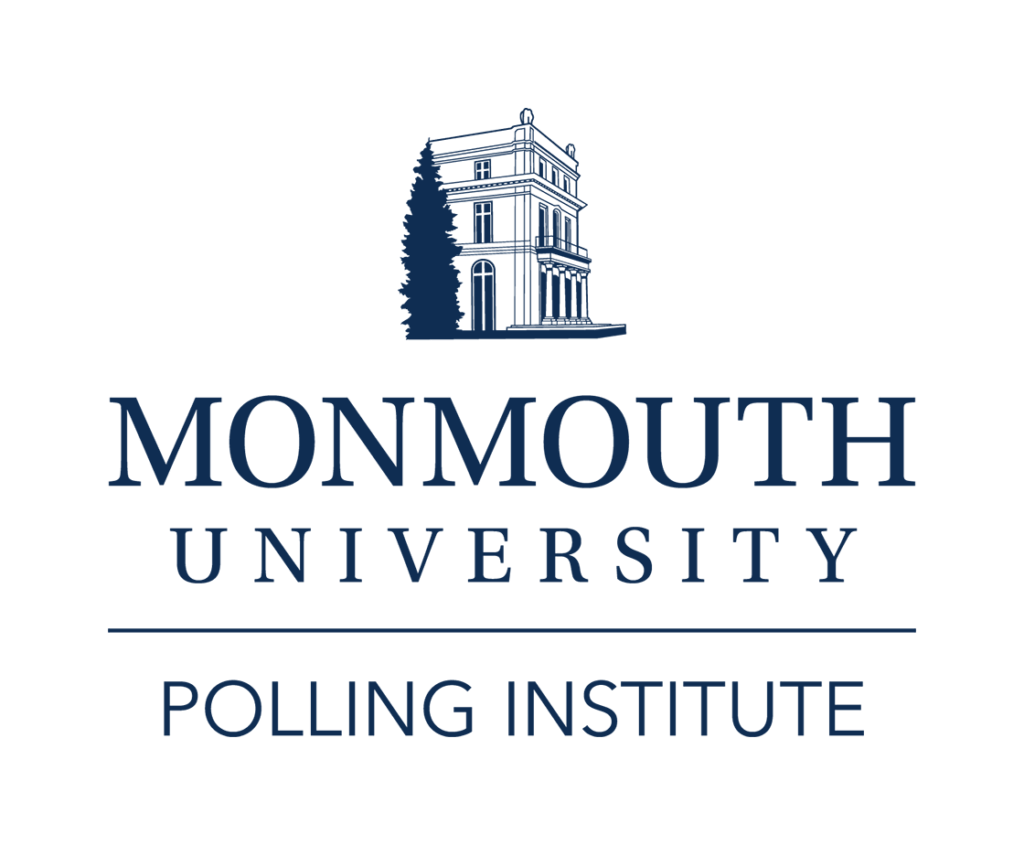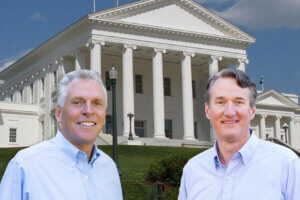West Long Branch, NJ – As the presidential campaign heads into Super Tuesday, the Monmouth University Poll finds large leads for both party primaries in the Commonwealth of Virginia. Donald Trump is the favorite in the Republican contest, while Hillary Clinton has the advantage in the Democratic race.
— Republican primary —
Donald Trump dominates the Old Dominion, earning the support of 41% of likely GOP primary voters there. Marco Rubio is currently in second place at 27%, followed by Ted Cruz (14%), John Kasich (7%), and Ben Carson (7%).
Male voters give Trump (49%) a strong advantage over Rubio (23%) and Cruz (15%), while women more narrowly prefer to Trump (33%) to Rubio (30%). Trump leads among nearly every other demographic group, though, with some of his strongest support coming from voters who have only a high school education (54%).
“Trump said he loves the poorly educated and apparently they love him back,” said Patrick Murray, director of the independent Monmouth University Polling Institute.
Just over one-third (36%) of likely Republican primary voters say that they are completely decided on their candidate choice just days before Tuesday’s election. Another 40% have a strong preference but are still open to considering other candidates. One-in-four either have only a slight preference (12%) or are really undecided (12%). More than half (53%) of Trump voters, though, say their vote choice is locked in.
There has been some speculation that Trump may be more vulnerable if fewer candidates were in the race. Monmouth tested a pair of hypothetical three-person races and found little support for that notion, at least in Virginia. In a race against just Cruz and Rubio, Trump garners 42% support, which is similar to his vote share in the current 5-person contest. Rubio’s support would increase slightly to 32% while Cruz’s support would increase slightly to 19%. In this scenario, Rubio could potentially win the support of political moderates, non-evangelicals, women, and voters over age 65, but Trump would still win nearly every other group. Kasich, the other so-called establishment candidate left in the race, would not fare quite as well if he replaced Rubio in the three-way match up. In this situation, Trump would potentially get 45%, Cruz 27%, and Kasich 22%.
When Virginia Republicans are asked if they would be okay with any of the five remaining candidates becoming the party’s nominee, just over 4-in-10 (43%) say yes and 7% are not sure. About 1-in-4 (26%), though, say they would be upset if the front-runner, Trump, won the nomination and 23% say the same about Cruz. About 1-in-10 would be unhappy with either Kasich (12%), Rubio (10%), or Carson (10%) as the GOP nominee.
— Democratic primary —
Hillary Clinton currently holds a sizable 60% to 33% lead over Bernie Sanders in Virginia’s Democratic primary. In 2008, Clinton lost this state to Barack Obama by nearly 30 points (64% to 35%).
Clinton currently leads among both white (58% to 39%) and black (70% to 19%) voters; men (59% to 37%) and women (61% to 31%); and voters age 50 and older (74% to 22%). The two candidates are basically tied among voters under 50 years old at 46% for Sanders and 45% for Clinton.
“The ace in the hole for Sanders so far has been younger voters. But this group is not giving him quite the same advantage in Virginia as it had in prior contests,” said Murray.
Nearly 3-in-4 Virginia Democrats say that Clinton would do either an excellent (26%) or good (47%) job addressing the most important concerns of families like theirs. This compares to 6-in-10 who say the same about Sanders (21% excellent and 40% good).
Nearly half (47%) of likely Democratic primary voters say that they are completely decided on their candidate choice. Supporters of Sanders (52%) and Clinton (50%) are equally as likely to say their vote is locked in. Another 29% of Democrats have a strong candidate preference but are still open to considering others. About 1-in-4 either have only a slight preference (10%) or are really undecided (13%).
The Monmouth University Poll was conducted by telephone from February 22 to 24, 2016 with 421 Virginia voters likely to vote in the Republican presidential primary and 302 Virginia voters likely to vote in the Democratic presidential primary. The Republican likely primary voter sample has a margin of error of ± 4.8 percent and the Democratic likely primary voter sample has a margin of error of ± 5.6 percent. The poll was conducted by the Monmouth University Polling Institute in West Long Branch, NJ.
DATA TABLES
The questions referred to in this release are as follows:
(* Some columns may not add to 100% due to rounding.)
ASKED OF LIKELY REPUBLICAN PRIMARY VOTERS:
R1. If the Republican primary election for president was today, would you vote for – [NAMES WERE ROTATED]
| February 2016 | |
| Donald Trump | 41% |
| Marco Rubio | 27% |
| Ted Cruz | 14% |
| John Kasich | 7% |
| Ben Carson | 7% |
| (VOL) Other | 0% |
| (VOL) Undecided | 4% |
| (n) | (421) |
R2. Which of the following best describes where your decision stands at this moment: I am completely decided on which candidate I will support, I have a strong preference right now but I am willing to consider other candidates, I have a slight preference among a group of candidates I like, or I am really undecided among a number of candidates?
| February 2016 | |
| Completely decided | 36% |
| Strong preference | 40% |
| Slight preference | 12% |
| Undecided | 12% |
[QUESTIONS R3 & R4 WERE ROTATED]
R3. If it came down to the following three candidates, who would you support – [NAMES WERE ROTATED]
| February 2016 | |
| Donald Trump | 42% |
| Ted Cruz | 19% |
| Marco Rubio | 32% |
| (VOL) No one | 1% |
| (VOL) Undecided | 7% |
R4. If it came down to the following three candidates, who would you support – [NAMES WERE ROTATED]
| February 2016 | |
| Donald Trump | 45% |
| Ted Cruz | 27% |
| John Kasich | 22% |
| (VOL) No one | 1% |
| (VOL) Undecided | 5% |
R5. Would you be okay with any of the five remaining candidates winning the Republican nomination or would any of them make you unhappy if he became the nominee? Who would you be unhappy with as the Republican nominee? [MULTIPLE RESPONSES ACCEPTED]
| February 2016 | |
| Ben Carson | 10% |
| Ted Cruz | 23% |
| John Kasich | 12% |
| Marco Rubio | 10% |
| Donald Trump | 26% |
| (VOL) Don’t know | 7% |
| No one, would be okay with any as the nominee | 43% |
ASKED OF LIKELY DEMOCRATIC PRIMARY VOTERS:
D1. If the Democratic primary election for president was today, would you vote for – [NAMES WERE ROTATED]
| February 2016 | |
| Hillary Clinton | 60% |
| Bernie Sanders | 33% |
| (VOL) Other | 0% |
| (VOL) Undecided | 7% |
| (n) | (302) |
D2. Which of the following best describes where your decision stands at this moment: I am completely decided on which candidate I will support, I have a strong preference right now but I am willing to consider other candidates, I have a slight preference among a group of candidates I like, or I am really undecided among a number of candidates?
| February 2016 | |
| Completely decided | 47% |
| Strong preference | 29% |
| Slight preference | 10% |
| Undecided | 13% |
[QUESTIONS D3 & D4 WERE ROTATED]
If elected President…
D3. How good a job would Hillary Clinton do addressing the most important concerns of families like yours – excellent, good, only fair, or poor?
| February 2016 | |
| Excellent | 26% |
| Good | 47% |
| Only fair | 13% |
| Poor | 6% |
| (VOL) Don’t know | 8% |
D4. How good a job would Bernie Sanders do addressing the most important concerns of families like yours – excellent, good, only fair, or poor?
| February 2016 | |
| Excellent | 21% |
| Good | 40% |
| Only fair | 18% |
| Poor | 9% |
| (VOL) Don’t know | 12% |
The Monmouth University Poll was sponsored and conducted by the Monmouth University Polling Institute from February 22 to 24, 2016 with a statewide random sample of Virginia voters drawn from a list of registered voters, who participated in a primary election in 2012, 2013 or 2014 or voted in at least two of the last three general elections, and indicate they will vote in the presidential primary on March 1, 2016. Monmouth is responsible for all aspects of the survey design, data weighting and analysis. Final sample is weighted for age and gender based on state registration list information on the pool of voters who participate in primary elections. Data collection support provided by Braun Research (field) and Aristotle (voter list and non-voter sample). The total sample of 723 likely voters includes 474 contacted by a live interviewer on a landline telephone and 249 contacted by a live interviewer on a cell phone, in English.
For results based on the sample of 421 likely Republican primary voters, one can say with 95% confidence that the error attributable to sampling has a maximum margin of plus or minus 4.8 percentage points (unadjusted for sample design). For results based on the sample of 302 likely Democratic primary voters, one can say with 95% confidence that the error attributable to sampling has a maximum margin of plus or minus 5.6 percentage points (unadjusted for sample design). Sampling error can be larger for sub-groups (see table below). In addition to sampling error, one should bear in mind that question wording and practical difficulties in conducting surveys can introduce error or bias into the findings of opinion polls.
| POLL DEMOGRAPHICS (weighted) | ||
| LIKELY REPUBLICAN PRIMARY VOTERS | ||
| 52% Male | 12% 18-34 |
93% White |
| 48% Female | 29% 35-49 |
3% Black |
| 32% 50-64 |
2% Hispanic | |
| 27% 65+ |
2% Other | |
| POLL DEMOGRAPHICS (weighted) | ||
| LIKELY DEMOCRATIC PRIMARY VOTERS | ||
| 43% Male | 23% 18-34 |
59% White |
| 57% Female | 25% 35-49 |
30% Black |
| 35% 50-64 |
7% Hispanic | |
| 17% 65+ |
5% Other | |
Click on pdf file link below for full methodology and results by key demographic groups.




